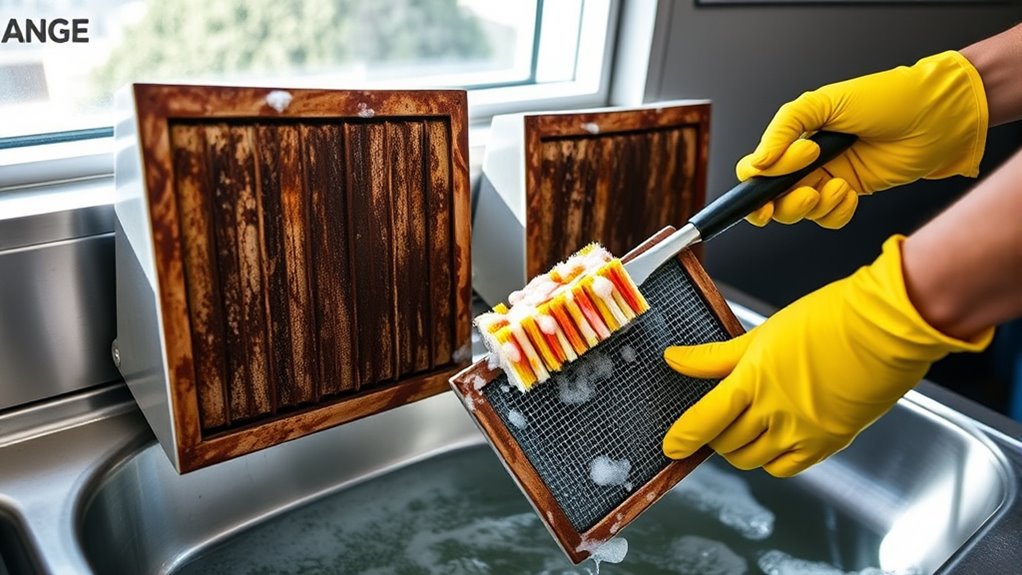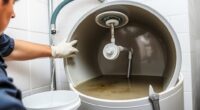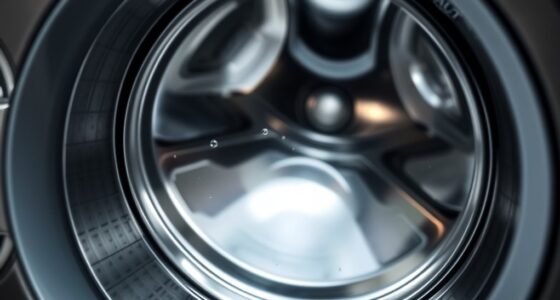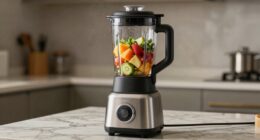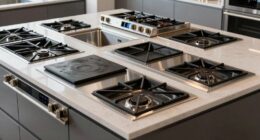To improve ventilation, you should regularly clean your range hood filters to prevent grease buildup that restricts airflow. Remove the filters easily and soak them in warm, soapy water or a vinegar solution for 15-20 minutes. Gently scrub away grease with a soft brush or sponge, then rinse and air dry before reinstalling. Proper maintenance guarantees your venting system works efficiently and your kitchen stays fresher—learn more about keeping your filters in top condition.
Key Takeaways
- Remove filters regularly to prevent grease buildup that restricts airflow and reduces ventilation efficiency.
- Soak filters in warm, soapy water or vinegar solution for 15-20 minutes to loosen grease and grime.
- Gently scrub filters with a soft brush or sponge to thoroughly clean and restore proper ventilation.
- Rinse filters thoroughly and air dry before reinstalling to maintain optimal airflow.
- Maintain consistent cleaning routines to ensure efficient venting and prevent fire hazards caused by grease accumulation.
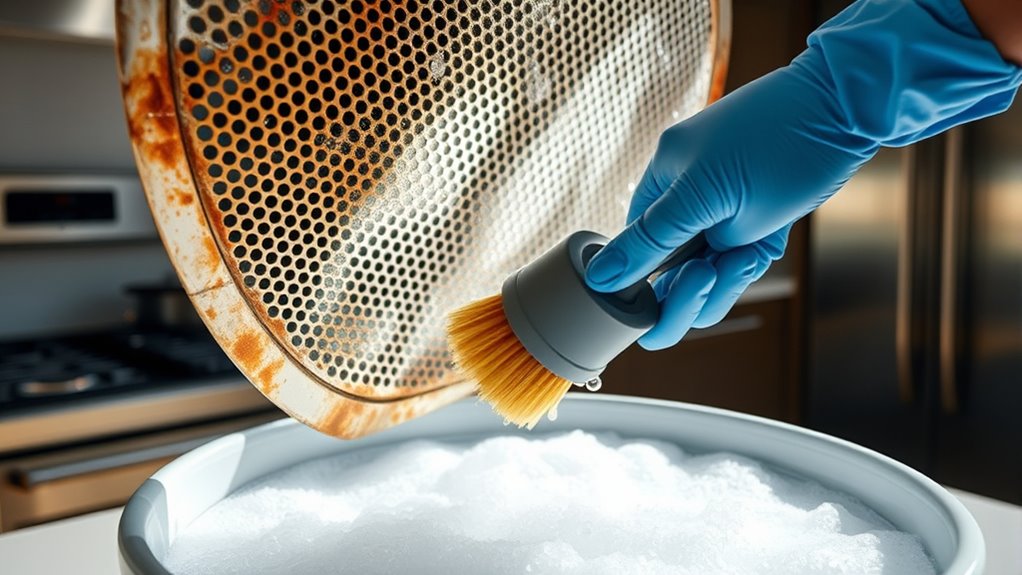
A clean range hood filter is essential for maintaining good air quality in your kitchen and ensuring your venting system works efficiently. When grease buildup occurs on your filter, it can hinder airflow, making your range hood less effective at removing smoke, odors, and airborne particles. Regular filter maintenance is key to preventing this problem and keeping your kitchen safe and fresh. If you neglect cleaning your filter, grease and grime accumulate over time, creating a thick layer that restricts air circulation. This not only affects the performance of your range hood but can also pose fire hazards if grease builds up excessively. Consequently, staying on top of filter maintenance should be a priority in your kitchen routine.
Regularly cleaning your range hood filter keeps air fresh and prevents fire hazards.
Cleaning your range hood filter is straightforward, but it does require some consistency. The first step is to remove the filter from your range hood. Most filters are designed to slide or pop out easily. Once removed, it’s important to assess the level of grease buildup. For minor accumulation, a simple soak in warm, soapy water can do the trick. Use a degreasing dish soap or a mixture of hot water and vinegar to cut through the grease. Let the filter soak for at least 15-20 minutes to loosen the grime. After soaking, scrub gently with a soft brush or sponge to remove stubborn grease spots without damaging the filter. Rinse thoroughly with warm water and let it air dry completely before reinstalling.
For filters with heavy grease buildup, a stronger cleaning method might be necessary. You can use a commercial degreaser or a baking soda paste to tackle stubborn deposits. Apply the degreaser or paste directly to the filter, let it sit for a few minutes, then scrub and rinse. Avoid using abrasive materials that could damage the filter surface. It’s also a good idea to inspect your filter regularly, ideally once a month, especially if you cook frequently. This way, you can catch grease buildup early and prevent it from becoming a major cleaning ordeal. Additionally, choosing the appropriate filter type can improve cleaning efficiency and extend the lifespan of your range hood.
Consistent filter maintenance not only improves airflow but extends the lifespan of your range hood. It’s a simple task that pays off by ensuring your kitchen stays well-ventilated and free from lingering odors. Remember, a clean filter means your venting system performs at its best, keeping your cooking environment safer and more pleasant. So, make it a habit to check, clean, and maintain your range hood filter regularly, and you’ll enjoy a more efficient, healthier kitchen.
Frequently Asked Questions
How Often Should I Replace My Range Hood Filters?
You should replace your range hood filters every 6 to 12 months, depending on your cooking frequency and filter condition. Regular filter replacement is essential for ideal ventilation and air quality. Follow a consistent cleaning schedule, and inspect filters monthly to see if they’re clogged or greasy. If they look dirty or aren’t functioning well, it’s time for a filter replacement to keep your kitchen fresh and safe.
Can I Use Vinegar to Clean the Filters?
Yes, you can use vinegar cleaning to clean your range hood filters. Vinegar is an eco-friendly solution that helps break down grease and grime effectively. To use, soak the filters in a mixture of vinegar and warm water or spray the solution directly onto them. Let it sit for a few minutes, then scrub with a soft brush and rinse thoroughly. This method keeps your filters clean without harsh chemicals.
Are There Eco-Friendly Cleaning Options for Filters?
Think of your filters as guardians of your kitchen’s air, and eco-friendly options are their armor. You can choose biodegradable cleaners that break down naturally, protecting the environment. Reusable filters act like loyal allies, reducing waste and maintaining airflow. By using these eco-friendly choices, you’re nurturing your home and the planet, ensuring clean air and sustainable living without sacrificing effectiveness. It’s a win for you and Earth alike.
What Signs Indicate My Filter Needs Replacing?
You’ll want to replace your filter if you notice discoloration or persistent odors that won’t go away after cleaning. Discolored filters often look greasy or stained, indicating they’re clogged and less effective. If odors linger despite cleaning, it’s a sign the filter’s worn out. Regularly check for these signs to guarantee your range hood functions properly and maintains good ventilation. Don’t delay replacing a worn filter to keep your kitchen fresh.
How Do I Prevent Grease Buildup on Filters?
To prevent grease buildup on filters, you should regularly perform filter maintenance, ideally once a month. Use hot, soapy water or a degreasing cleaner to soak and scrub the filters thoroughly. Avoid letting grease accumulate, as it can hinder ventilation. Additionally, cover your stove with a splatter guard to reduce grease splatters. Consistent grease prevention and filter upkeep keep your range hood functioning efficiently and extend the life of your filters.
Conclusion
Keeping your range hood filters clean is like tending a garden; it requires regular care to let your kitchen breathe freely. When you clear away grease and grime, you’re not just maintaining equipment—you’re nurturing a sanctuary where fresh air flows effortlessly. Think of your efforts as watering roots that support a healthy, vibrant space. With each cleaning, you’re planting the seeds for a cleaner, brighter kitchen, where air and energy flourish in harmony.
